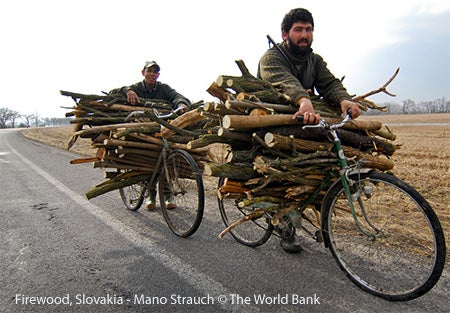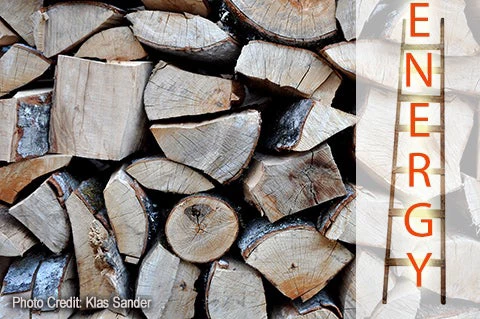Spring has arrived. Despite a late start, this winter lasted longer than usual in many countries, especially in various parts of Europe. And this year again, the melting snows reveal a trend that has been observed over the past several years: households are increasingly using wood to heat their homes. No, this time we are not talking about World Bank client countries where wood is known to account for large shares of energy consumption.
This time, it is Germany, where the residential use of woodfuel reportedly increased by almost 300% between 2000 and 2010, translating into total wood volumes of 33 million m³ in 2010. In fact, across the EU, the use of wood for energy in private households remains the most important sector for wood consumption with total residential wood energy projected to increase to 163 million m³ in 2020.
This raises the question: are consumers in developed economies climbing down the “energy ladder,” while at the global level the clear objective is to move people up the ladder and away from so-called “traditional” fuels (or at least to increase the share of modern fuels in a household energy portfolio)? The answer seems almost trivial: prices drive consumers to change their behavior.
In Germany, heating costs rose by an estimated 22% for some households. In austerity-stricken Greece, the use of wood for energy has soared in popularity due to doubling of heating oil prices in two years. In Athens, this has caused one of the worst smog situations in decades this past winter. Similar narratives emerge from other countries across Europe, where the increased use of wood for energy is also linked to high energy prices.
But this is only one part of the story. As the German magazine Der Spiegel reported, there has also been a rise in wood theft. For example, 10% of all firewood coming out of the forests of the state of Brandenburg is estimated to be stolen, worth half a million Euros. While this seems small at first glimpse, similar observations are reported by forestry staff throughout Germany and the overall impact may be beyond the sum of the monetary parts.

In Greece, the forest service is suffering from budget cuts and has been unable to prevent the recent increase in forest crime, with inhabitants of Athens and rural Greece chopping down – often illegally – trees in urban areas, forests and parks. The olive tree under which Plato is said to have taught his students was even cut down illegally for firewood this winter.
It would be tempting to remember the times when wood theft was regarded as a form of “subsistence-criminality” and “resistance exercised by the poor to defend the traditional rural economic and social system” (also discussed in 1842 by Karl Marx in his “Debates on thefts of wood” in the Rheinische Zeitung, a German newspaper). But for us and our colleagues working at the Bank, there are striking similarities with the persistent forest governance challenges faced today by client countries in their efforts to achieve sustainable forest management, use and conservation. Myopic about future impacts and guided by individual economic constraints and incentives, people are collectively destroying the very natural capital on which their own long-term prospects depend.
The situation in Europe highlights that the sustainability of forest management and legality of forest use cannot be taken for granted, even in OECD countries, and that natural capital can serve as an economic and social safety net during challenging economic times. It also underscores the importance of designing and implementing forest laws and regulations that take into account both the needs and priorities of local people and the incentive system (prices for example) that guides people’s behavior. From an energy perspective, it may also indicate that wood is not so “traditional” after all and it could be part of a modern energy mix if produced and utilized applying strict sustainability criteria.





Join the Conversation